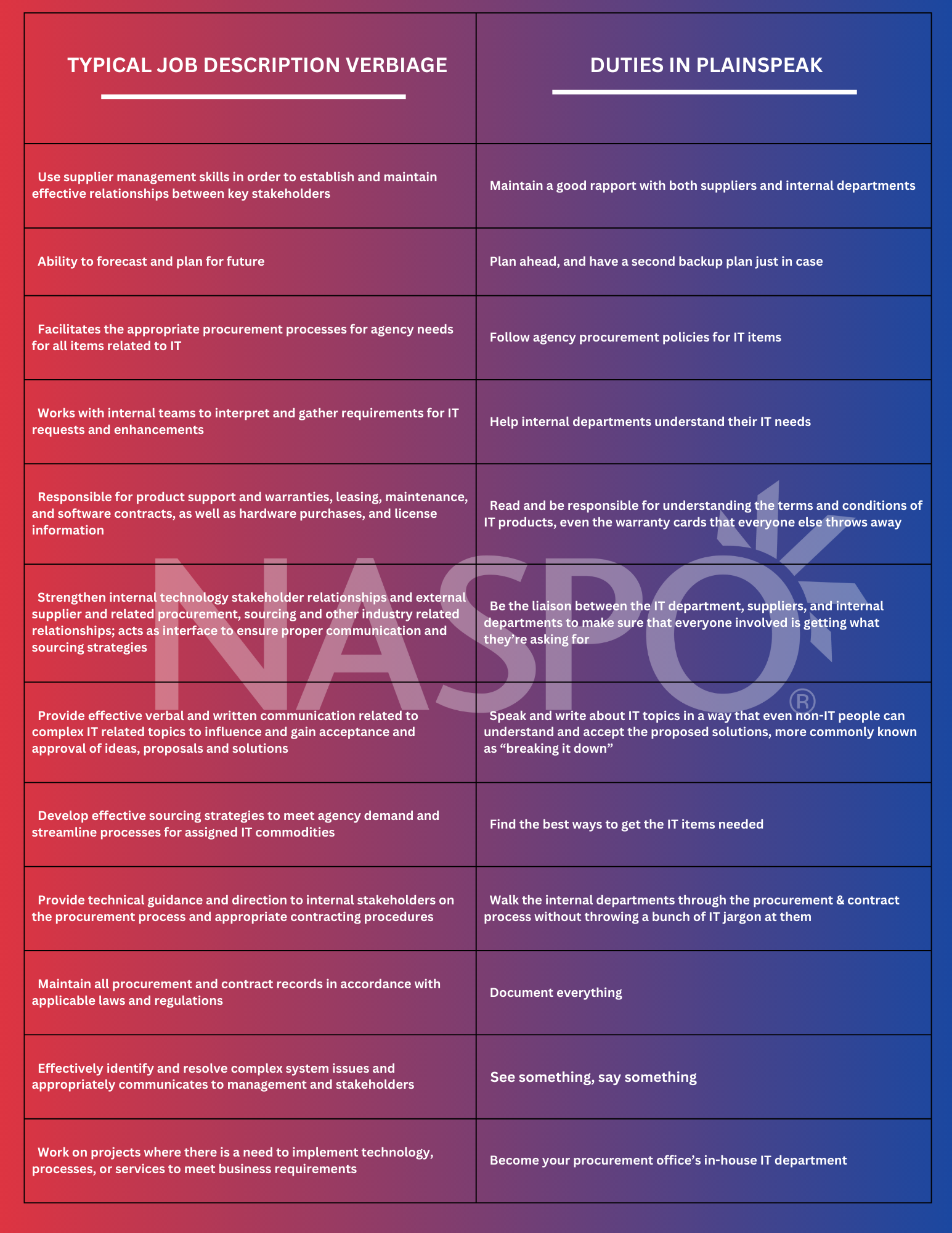
Finding IT Talent in a Haystack! Part I
June 13, 2023 | by Telice Gillom
Finding qualified procurement professionals for IT roles at public agencies can feel like searching for a needle in a haystack. But there can be easy ways to find the skills you need.
Many agencies lack the necessary knowledge and expertise in IT procurement, making it difficult to identify and train the right candidates. It’s crucial to consider unique qualifications and skill sets when searching for the right person for the job. Unfortunately, there is a lack of IT procurement-specific training programs, leaving many agencies to rely on in-office experience as their primary method of training.
So, what’s a public agency looking for IT procurement professionals to do? Isn’t there a plethora of IT professionals in the workforce to choose from? Unfortunately, it’s not as simple as just finding a person with an IT background to fill the role, in part because:
- Typically, IT professionals can command much higher salaries with careers in their field of experience in the private sector than they would receive in a public procurement office.
- Many experienced IT professionals simply have little desire to go into procurement.
- Procurement positions typically take an extroverted personality type, which may not suit some IT professionals.
If your agency struggles to find your proverbial needle in a haystack, consider these five ways to find the tech-savvy procurement professional your agency needs:
1. Re-imagine the IT Procurement Position
CPOs ideally should ask themselves:
Do I want a procurement person who knows IT well?
Or do I want an IT person who knows procurement?
Your answers should direct how you re-imagine the position for your departmental needs. Suppose the person is only dealing with IT procurements occasionally or handling IT projects of a more straightforward nature. In that case, the position and accompanying job description should be structured to reflect this. If the person strictly handles IT-related procurements and/or more complex projects, restructure the position accordingly. Either way, the role should be revised to be more open to modernization and automation while leaving room for flexibility and potential expansion.
2. Education and Professional Development
Many public agencies require employees to have a minimum of a formal 4-year degree but keep in mind that candidates with a 4-year degree in IT will have many other options. Alternatively, consider other analytical majors like Accounting or well-rounded majors like Business Administration. Or consider that a comparable amount of experience and/or procurement certifications may be substituted for the minimum requirements. Highly qualified candidates can be found outside traditional talent clusters; more and more people are acquiring critical skills in nontraditional educational programs. By placing less emphasis on academic degrees and looking beyond traditional talent pools, you may potentially find more diverse internal and external candidates.
3. Seek Business Knowledge/Soft Skills
IT procurements require a lot of highly analytical, mathematical, and detail-oriented tasks, but they also require a great deal of “soft skills” or business knowledge, such as:
- internal/external customer service
- collaboration
- communication
- fostering a positive rapport with a diverse array of people
- negotiation
- time management
Most of these things cannot be learned by reading a book or watching a webinar. Consider that professionals adept at these soft skills may not have learned them in the procurement world. For example, take someone who had previously been a high school teacher. They would have demonstrated each of the soft skills previously listed to effectively deal with roomfuls of teenagers daily, so there’s a good chance they can deal with adults using a similar approach. Keep an eye out for the varied ways someone may have demonstrated their transferable business knowledge; it may not be spelled out in black and white on their resumes, but the evidence is there in their experiences.
4. Reconsider the Actual List of Duties
Job titles and their accompanying lists of duties can potentially draw unnecessary boundaries. Remember that there’s always more than one way to talk about what the person would be doing, and there’s always more than one way to do the thing. A formally written job description has its place, but sometimes, it’s okay to speak plainly about what the job entails for a slightly more relaxed approach. This doesn’t necessarily mean that the duties would be taken lightly; the right candidate understands the seriousness of the work. Take a look at the chart below to see some typical job description verbiage for IT procurement positions, followed by the same duties spelled out differently:
Typical Job Description Verbiage Table:
5. Befriend your IT Department
Think about it- who else, among the other members of your organization, is better equipped to help you understand your agency’s IT procurement needs than the people whose job it is to know? Be genuine in your intentions, and don’t be afraid to request their input about what it will take for an IT procurement professional to be successful in your agency’s newly defined role. The IT department staff must keep abreast of the latest IT topics that are or will affect your agency, so if you’re seeking to fill an IT procurement role, they can help you understand what competencies to look for in candidates. IT procurement staff has to work closely with the IT department, so initiating and maintaining a favorable working relationship with them is a great strategy.
Hopefully, these strategies will make your search for a procurement professional that can handle your agency’s IT procurements a bit less like the search for the proverbial needle, saving everyone a bit of time and headache. But what if you are already a public procurement professional, and you want to steer your career into the fascinating world of IT? Stay tuned for the second part of our series, where we’ll apply these same strategies to help your transition less perplexing.
For more resources be sure to check out:
Another Resource for your Procurement Toolbox: PTAC

